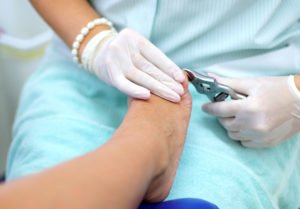Ingrown Nail: Causes, Remedies, and Professional Treatment
An ingrown toenail may not cause much discomfort at first, but once the pain begins, it’s hard to ignore. If left untreated, the infection can quickly turn into a serious problem, especially for people with underlying health conditions. For instance, ingrown toenails in diabetes patients or those with poor circulation can lead to severe complications. That’s why it’s important to act quickly and seek professional help when symptoms first appear. At Empire Foot & Ankle, we provide expert treatment for ingrown nails so you can walk comfortably again.
Common Causes of Ingrown Nails
Several everyday habits and conditions can lead to an ingrown toenail. The most common causes include:
- Wearing tight-fitting footwear that puts pressure on your toes
- Incorrect nail trimming techniques, such as cutting nails too short or rounding the edges
- Thickened nail plates, which push into the surrounding skin
- Toe trauma or injury from sports or accidents
- Subungual Exostosis (SE) – a bony growth under the nail
- Foot deformities like hallux valgus or lesser toe issues
Identifying the cause early can help prevent the condition from worsening.
Home Remedies for Ingrown Nails
While home remedies may not permanently solve the problem, they can provide temporary relief. Here are some safe ways to manage mild symptoms at home:
- Soak your foot in warm water with Epsom salt three to four times a day. This softens the skin and reduces swelling.
- Gently push the skin away from the nail with a cotton bud after soaking.
- Avoid repeated cutting of the nail, as it often makes the problem worse.
- Choose comfortable footwear with plenty of room for your toes to move.
These steps can ease discomfort, but if the pain persists or signs of infection appear, professional care is essential.
When to Contact Empire Foot & Ankle
Certain patients should not delay seeking treatment. If you have diabetes, a compromised immune system, or poor blood circulation, even mild ingrown nail symptoms should be treated immediately.
Additionally, if home remedies fail to improve your condition within a week—or if you notice infection signs like redness, swelling, pus, foul odor, or severe pain—it’s time to call our podiatry team.
Ingrown Nail Solutions by Empire Foot & Ankle
Our podiatrists offer a range of treatments depending on the severity of your condition:
- Partial nail removal – removing only the portion of the nail pressing into the skin
- Nail bed treatment – addressing the root cause to prevent reoccurrence
- Cotton placement – inserting cotton wool under the nail edge to stop it from cutting into the skin
- Toenail avulsion (surgery) – removing the ingrown part of the nail and sometimes the surrounding folds of skin. This procedure is performed under local or general anesthesia to ensure comfort.
At Empire Foot & Ankle, patient care is our priority. From minor treatments to surgical procedures, we make sure every step is carried out with precision, compassion, and comfort.
FAQs: About Ingrown Nail
Q1. What is an ingrown nail?
An ingrown nail happens when the edge of your toenail grows into the surrounding skin, causing pain, swelling, and sometimes infection.
Q2. What causes an ingrown nail?
Common causes include improper nail trimming, tight shoes, foot injuries, or naturally curved toenails.
Q3. How can I treat an ingrown nail at home?
Soaking your foot in warm water, keeping nails trimmed straight, and wearing comfortable shoes may help. However, professional care is best for severe or recurring ingrown nails.
Q4. When should I see a doctor for an ingrown nail?
If you have severe pain, infection signs (redness, pus, swelling), or frequent recurrences, visit a podiatry doctor for safe treatment.
Q5. Can an ingrown nail go away on its own?
Mild cases may improve with home care, but untreated ingrown nails often worsen. Early treatment prevents complications.

